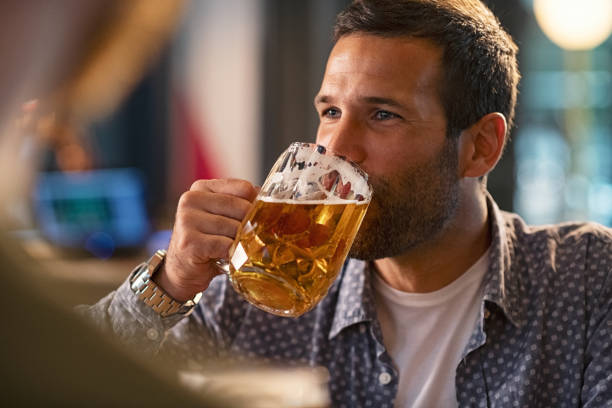Fizziness, stomach irritation, and excessive intake can each play a role in causing hiccups post-alcohol consumption. Alleviating strategies such as drinking cold water slowly or employing breathing exercises might provide relief.
Hiccups entail involuntary spasms of the diaphragm followed by abrupt closure of the vocal cords, resulting in the recognizable “hic” noise. Typically benign, hiccups usually cease on their own; however, persistent instances could hint at an underlying medical issue, warranting professional assessment.
Why it Happens
Understanding the mechanism behind alcohol-induced hiccups requires knowing the nature of hiccups themselves. Hiccups involve forceful contractions of the diaphragm, a muscle situated just beneath the lungs, separating the abdomen from the chest. Despite ongoing research, the precise triggers for these contractions remain uncertain.
However, alcohol is recognized as a catalyst for hiccups due to several factors. Firstly, any substance causing stomach distension can incite hiccups. This includes excessive consumption of various beverages, particularly beer and carbonated drinks like soda.
Given that the stomach lies directly beneath the diaphragm on the left side, distension from ingested substances may exert pressure on or irritate the diaphragm, triggering hiccups. Furthermore, activities such as conversing and eating hastily while drinking with companions might result in air swallowing, further contributing to stomach distension.
Moreover, alcohol’s irritative effects on the digestive system, including the esophagus, can provoke hiccups and escalate acid production, potentially leading to acid reflux—a condition also associated with hiccups.
How to Stop It
Usually, hiccups will cease spontaneously within a short span, but there are several methods you can attempt to cease it:
- Induce throat stimulation by ingesting a spoonful of sugar.
- Opt for slowly sipping or gargling ice water.
- Interrupt your breathing pattern by holding your breath momentarily.
- Employ the Valsalva maneuver, exhaling with your mouth closed while pinching your nose.
- Massage the back of your neck gently.
- Inhale and exhale into a paper bag.
- Bring your knees up to your chest and lean forward.
- Apply pressure to your diaphragm by bending forward.
- Nibble on a slice of lemon.
Are they Dangerous?
Typically, hiccups triggered by alcohol consumption are transient and pose minimal health risks, serving more as an inconvenience than a medical issue. Yet, in uncommon instances, hiccups may persist for extended periods, ranging from days to months or even longer, a condition known as singultus in medical terms.
Chronic hiccups represent a significant medical concern, potentially resulting in insomnia, fatigue, and weight loss if eating becomes challenging. If hiccups persist beyond 48 hours, individuals should promptly seek medical attention.
RELATED: Alcohol Mixed with Energy Drinks: What are the Risks?
Avoiding Hiccups in the future
There’s no foolproof way to entirely prevent alcohol-induced hiccups except for abstaining from alcohol consumption. However, there are several strategies to decrease the likelihood of experiencing them.
Consider the following tips next time you’re drinking to minimize the occurrence of hiccups:
- Avoid drinking beer.
- Skip carbonated drinks, including those mixed with soda.
- Consume your drinks slowly, avoiding rapid ingestion.
- Drink alcohol in moderation.
A Note from Biocleve
Unless experiencing persistent hiccups lasting more than a couple of days, post-drinking hiccups typically pose minimal concern. Alcohol commonly triggers hiccups, with susceptibility varying among individuals. Being mindful of alcohol quantity and type can help prevent these bothersome hiccups.
